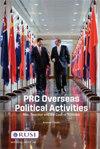英国和北方集团:必要的伙伴关系
Q4 Social Sciences
引用次数: 0
摘要
2017年末至2018年初,英国首相、国防大臣、国防参谋长和总参谋长都表示,俄罗斯构成了英国面临的主要安全威胁。这标志着英国有意摆脱20多年来主导英国国防观点的暴力极端主义和恐怖主义。英国武装部队越来越多地参与旨在对抗俄罗斯在欧洲大陆、高地北部和大西洋的侵略的行动。作为波罗的海空中警务任务的一部分,英国皇家空军每年轮换参加,将皇家海军的重要人员部署到波罗的海,将部队重新部署到挪威,作为北约演习的一部分,以及作为北约加强前沿存在任务的一部分,英国陆军士兵和武器在爱沙尼亚的存在,都清楚地表明了对俄罗斯行动和日益增长的影响力的军事对抗的重视。武装部队组建了新的军事集团,如77旅,专门打击俄罗斯的活动。在政治层面,自2016年以来,议会机构的正式报告和对英国面临的威胁的更一般的调查都强调了俄罗斯在北大西洋和本文章由计算机程序翻译,如有差异,请以英文原文为准。
IV. The UK and the Northern Group: A Necessary Partnership
Between late 2017 and early 2018, the UK prime minister, the secretary of state for defence, chief of the Defence Staff and chief of the General Staff all stated that Russia constitutes the primary security threat facing the UK. This signals a deliberate shift from the preoccupation with violent extremism and terrorism that has dominated UK views on defence for more than two decades. The UK’s armed forces have been increasingly engaged in actions designed to counter Russian aggression in continental Europe, the High North and the Atlantic Ocean. The participation of the RAF as part of the Baltic Air Policing mission on an annual rotation, the deployment of significant elements of the Royal Navy to the Baltic Sea, the redeployment of forces to Norway as part of NATO exercises, and the presence of British Army soldiers and weapons in Estonia as part of the NATO Enhanced Forward Presence mission are all clear indicators of the emphasis being placed on a military counter to Russian actions and growing influence. The armed forces have formed new military groupings, such as 77 Brigade, specifically to counter Russian activities. At the political level, since 2016 both formal reports by parliamentary bodies and more generic inquiries about threats facing the UK have highlighted Russian activities in the North Atlantic and
求助全文
通过发布文献求助,成功后即可免费获取论文全文。
去求助
来源期刊

Whitehall Papers
Social Sciences-Archeology
自引率
0.00%
发文量
12
期刊介绍:
The Whitehall Paper series provides in-depth studies of specific developments, issues or themes in the field of national and international defence and security. Published three times a year, Whitehall Papers reflect the highest standards of original research and analysis, and are invaluable background material for policy-makers and specialists alike.
 求助内容:
求助内容: 应助结果提醒方式:
应助结果提醒方式:


